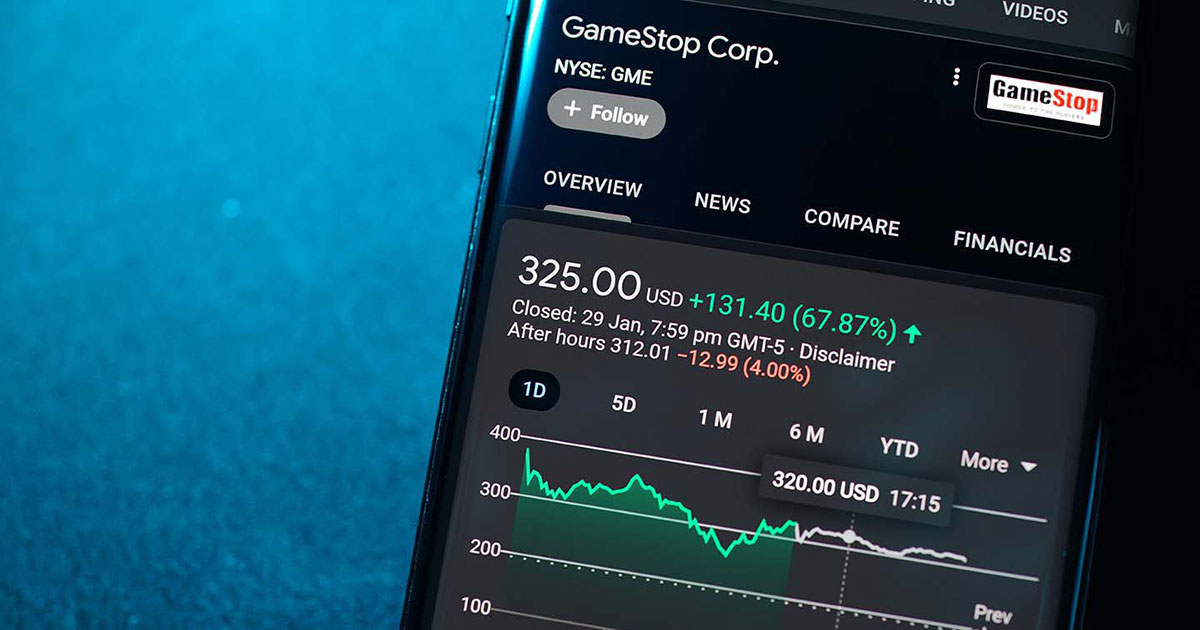The Volatility Surrounding GameStop Stock Explained

If you thought March 2020 provided a wild few days for traders and investors, January 2021 would like a word.
The week of madness in the market saw stocks such as GameStop explode from $95 a share to kick off Tuesday to $468 a share shortly after the Thursday opening bell.
This volatility can be traced back to Wall Street Bets, a Reddit group of millions of traders, many of whom hatched a plan to drive the GameStop share price higher in what is defined as a short squeeze, says Patrick Gregory, managing director of the Stephen D. Cutler Center for Investments and Finance at Babson College.
“There’s a strong argument to be made that the stock is no longer trading on fundamentals, it’s trading on momentum,” he said.
The effects go beyond just GameStop. Traders also have dabbled in companies such as AMC, Blackberry, and Bed Bath & Beyond to invoke much of the same results, while the S&P 500 had its biggest weekly drop since October.
Here are six things to know about the unique week in the stock market.
What is a stock short?
Financial markets provide opportunity to profit whether stocks go up or down. In a stock short, which brings plenty of risk, sellers borrow shares they sell in the present, with the hope of buying them back at some point in the future at a lower price.
“The math works against you,” Gregory said. “The market tends to be up every three to four years and the most you can make on a short is 100 percent while the loss is theoretically unlimited. The risk is that the stock goes up.”
Why GameStop?
Traders chose to buy shares of GameStop because it has a high level of short interest.
“A lot of it goes back to that Reddit group,” Gregory said. “If you have a coordinated effort of enough investors buying, pushing the price higher, it will create a short squeeze … not only do you have people buying the stock, which is driving the price higher, but you have short sellers covering their positions at extremely high rates.”
“There’s a strong argument to be made that the stock is no longer trading on fundamentals, it’s trading on momentum.”
Patrick Gregory, managing director of the Cutler Center for Investments and Finance, on the GameStop share price.
Why has this happened at this point in time?
It’s likely due to the pandemic, Gregory said. In September, TD Ameritrade reported that visits to its website giving instructions on trading stocks had nearly quadrupled since January, according to CNBC. This exponential rise in trading has been fueled by increased screen time over the past 12 months and the current ease of executing a stock trade through mobile devices.
What’s motivating this group of investors?
Social media fame. And, the chance to make a quick dollar.
“A lot of people are posting snapshots of Robinhood accounts and so forth showing 1,000-plus point returns,” Gregory said. “That creates a feeding frenzy where other people want to get a piece of the action.”
Is this another example of why the stock market and economy shouldn’t be regarded in the same light?
The short answer? Yes.
“I always think we have to separate the two,” Gregory said. “If anyone needed a reminder of that, you don’t have to look back further than 2020. The economy came to a grinding halt, yet, the stock market continued to move higher.”
What happens next?
Since Wednesday, TD Ameritrade and Robinhood have imposed restrictions on traders’ ability to purchase shares of companies such as GameStop, in an effort to temper the frenzy. The SEC later stated it was investing this decision.
“You want cooler heads to prevail, and have people think more rationally about where they want to invest and the risks inherent in those stocks,” Gregory said.
Could a week of volatility like this occur again in the future? Potentially, says Gregory. Yet, all of that could change if this new wave of investors were to experience their first bear market.
“It’s a lot more fun to make money than it is to lose money,” he said. “When investors are on the other side of these trades, they may adopt a more measured, thoughtful approach to investing.”
Posted in Insights




